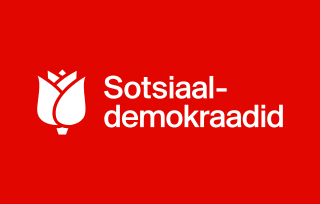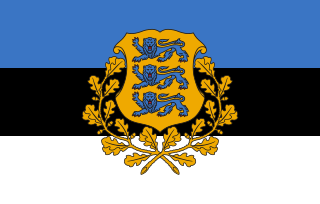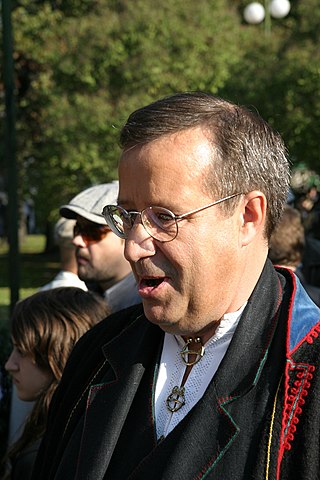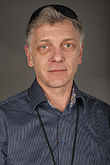Politics in Estonia takes place in a framework of a parliamentary representative democratic republic, whereby the Prime Minister of Estonia is the head of government, and of a multi-party system. Legislative power is vested in the Estonian parliament. Executive power is exercised by the government, which is led by the prime minister. The judiciary is independent of the executive and the legislature. Estonia is a member of the United Nations, the European Union, and NATO.

The history of Estonia forms a part of the history of Europe. Human settlement in what is now Estonia became possible 13,000–11,000 years ago, after the ice from the last glacial era had melted, and signs of the first permanent population in the region date from around 9000 BCE.

Arnold Rüütel was an Estonian politician. He was the third President of Estonia from 8 October 2001 to 9 October 2006. Rüütel was the second president of the country after the end of the 1944–1991 Soviet occupation, and the restoration of the independent Republic of Estonia on 20 August 1991.

The People's Union of Estonia was a political party in Estonia. Its last leader was Margo Miljand.

An election for Members of the European Parliament representing Estonia constituency for the 2004–2009 term of the European Parliament was held on 13 June 2004. It was part of the wider 2004 European election.

The Social Democratic Party is a centre-left political party in Estonia. It is currently led by Lauri Läänemets. The party was formerly known as the Moderate People's Party. The SDE has been a member of the Party of European Socialists since 16 May 2003 and was a member of the Socialist International from November 1990 to 2017. It is orientated towards the principles of social-democracy, and it supports Estonia's membership in the European Union. From April 2023, the party has been a junior coalition partner in the third Kallas government.

Toomas Hendrik Ilves is an Estonian politician who served as the fourth president of Estonia from 2006 until 2016.

The president of the Republic of Estonia is the head of state of the Republic of Estonia. The current president is Alar Karis, elected by Parliament on 31 August 2021, replacing Kersti Kaljulaid.

Parliamentary elections were held in Estonia on 7 March 1999. The newly elected 101 members of the 9th Riigikogu assembled at Toompea Castle in Tallinn within ten days of the election. The elections proved disastrous for the ruling Estonian Coalition Party, which won only seven seats together with two of its smaller allies. Following the elections, a coalition government was formed by Mart Laar of the Pro Patria Union, including the Reform Party and the Moderates. It remained in office until Laar resigned in December 2001, after the Reform Party had left the same governing coalition in Tallinn municipality, making opposition leader Edgar Savisaar new Mayor of Tallinn. The Reform Party and the Estonian Centre Party then formed a coalition government that lasted until the 2003 elections.

Alexander "Sascha" Van der Bellen, also referred to by the abbreviation VdB, is an Austrian politician serving as the president of Austria since 2017. He previously served as a professor of economics at the University of Vienna, and after joining politics, as the spokesman of the Austrian Green Party.

Andrus Ansip is an Estonian politician, a member of the European Parliament, the former European Commissioner for Digital Single Market and Vice President of the European Commission, in office from 2014 until 2019. Previously, he was Prime Minister of Estonia from 2005 to 2014 and chairman of the liberal Estonian Reform Party from 2004 to 2014.
Same-sex marriage has been legal in Estonia since 1 January 2024. The government elected in the March 2023 election, led by Prime Minister Kaja Kallas and consisting of the Reform Party, the Social Democrats and Estonia 200, vowed to legalize same-sex marriage. Legislation to open marriage to same-sex couples was introduced to the Riigikogu in May 2023, and was approved in a final reading by 55 votes to 34 on 20 June. It was signed into law by President Alar Karis on 27 June, and took effect on 1 January 2024. Estonia was the first Baltic state, the first post-Soviet state, the twentieth country in Europe, and the 35th in the world to legalise same-sex marriage.
An election for Members of the European Parliament from Estonia to the European Parliament was held on 7 June 2009.

Indrek Tarand is an Estonian politician and a former Member of the European Parliament (MEP) from Estonia. He was an independent politician, but a member of the European Green Party.

Estonian presidential elections, 2006 took place over four rounds, which were held on 28 and 29 August, and 23 September 2006. The first three rounds of the presidential election were held within the Riigikogu, which is Estonia's Parliament, as specified under electoral law. The two top candidates, Ene Ergma and Toomas Hendrik Ilves, were not elected because they did not obtain the required two-thirds of the votes in the Riigikogu.

Taavi Rõivas is an Estonian politician, former Prime Minister of Estonia from 2014 to 2016 and former leader of the Reform Party. Before his term as the Prime Minister, Rõivas was the Minister of Social Affairs from 2012 to 2014. On 9 November 2016 his second cabinet dissolved after coalition partners, Union of Pro Patria and Res Publica and Social Democratic Party, sided with the opposition in a no confidence motion. At the end of 2020, Rõivas announced quitting politics, and resigned from his parliament seat.

An indirect election took place in Estonia in 2016 to elect the president of Estonia, who is the country's head of state. The Riigikogu — the Parliament of Estonia — elected Kersti Kaljulaid to be the next head of state of Estonia to succeed Toomas Hendrik Ilves, who had served his second and final term as president. Kaljulaid is the first female head of state of Estonia.

An election for the Members of the European Parliament from Estonia as part of the 2024 European Parliament election took place on 9 June. Early voting took place from 3 June to 8 June.

Electoral district no. 4 is one of the 12 multi-member electoral districts of the Riigikogu, the national legislature of Estonia. The district was established as electoral district no. 5 in 1992 when the Riigikogu was re-established following Estonia's independence from the Soviet Union. It was renamed electoral district no. 4 in 1995 following the re-organisation of electoral districts. It is conterminous with the counties of Harju and Rapla. The district currently elects 15 of the 101 members of the Riigikogu using the open party-list proportional representation electoral system. At the 2019 parliamentary election it had 133,437 registered electors.

Estonia's 2001 presidential election took place from August 27 to September 21, 2001. After three rounds of voting in the Riigikogu and two rounds of voting in the electoral college, Arnold Rüütel was elected President.



















